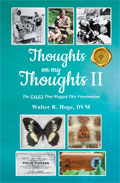
 |
Thoughts on My Thoughts II: The Tales that Wagged This Veterinarian
by Walter R. Hoge, DVM
MainSpring Books
This collection of life stories begins with the premise of being lost and trying to find one’s way out by walking in a straight line, with recent scientific evidence proving that it’s just not possible. Author Hoge shares the theory that if humans are not certain of the direction they are moving toward, they will walk in uncertainty, or in circles. Concluding that life must go beyond what people experience on this earth, Hoge shares appropriate scripture to add cement to his thoughts on finding more meaning with less risk, knowing that one will go beyond this single opportunity. The author writes of his years of experience as a veterinarian, sharing stories of the animals he has treated, the owners who have loved them, and how a veterinarian must have compassion for both. He states that his faith in God helps in overcoming life’s pain to experience grace and goodness.
Chapters are backed up with quotations from notable figures such as Abraham Lincoln and Emily Dickinson, to name just a few. Hoge asks the reader to look at themselves and determine their gifts. The author has found the good in others and understands why and how people self-destruct. This understanding provides a map that helps people find their way through terrible situations. Hoge shares memories of his deceased first wife and mother of his children with a tender and honest poignancy. Sharing his wisdom of years as a “devout” Mormon, he includes chapters on kindness that resonate in a world seemingly filled with anger. Readers will be intrigued by his thoughts on becoming involved in chaotic situations where people are releasing their anger and frustration out on others, helping them overcome their rage, and then making this act a calling in his life.
Providing hope in a world plagued by climate issues, Hoge reminds the reader that when dinosaurs roamed the earth, there wasn’t much of a temperature difference between now and then. Citing historical tracking, he thinks it may be that climate change is a stage that the earth will come out of one day, perhaps richer in vegetation and minerals, which might, in the end, be helpful. Providing recent research on spite, Hoge shares that virtue and vice both result from malice. In the examples studied, it was found that spitefulness created a more reasonable and just society.
Using the author’s experiences of life and work, and the knowledge that life-long learning and empirical evidence bring, Hoge’s book reads like a well-organized biography that moves beyond just his family’s interest. Any veterinarian or animal lover will likely enjoy having this book on their shelf. The index can help the reader to move by topic, and the quotes with citings encourage further reading at will. The reader will also undoubtedly appreciate the motivation and advice from notable personalities. A set of questions that can be used by anyone wishing to ask their family elders about the past will be useful in creating their own family narrative. Photos of family and precious artifacts provide a deeper meaning and help to make the text come to life. All combined, Hoge’s work shares a consistent theme of a compassionate and grateful life.